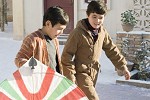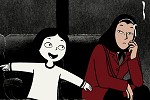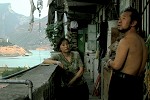 Shadows off the beaten path
Shadows off the beaten path< < F O R E I G N > >
last update 2.Dec.07
See also: SHADOWS FILM FESTIVAL
 R E V I E W B Y R I C H C L I N E
R E V I E W B Y R I C H C L I N E
 Khaled Hosseini's acclaimed novel is adapted for the screen with sensitivity by Benioff and Forster, drawing raw performances from the cast members and bringing the provocative themes to life in a subtly sympathetic way.
Khaled Hosseini's acclaimed novel is adapted for the screen with sensitivity by Benioff and Forster, drawing raw performances from the cast members and bringing the provocative themes to life in a subtly sympathetic way.
In bustling 1978 Kabul, young Amir (Ebrahimi) is the top kite-fighter in town, with his best buddy Hassan (Mahmidzada) as his runner, tracking down fallen kites with unusual skill. But a horrible event, followed by the Soviet invasion, separates the boys. Amir moves to San Francisco with his father (Ershadi), and 22 years later gets a phone call that takes him back home. Accompanied by driver Farid (Taghmaoui), Amir (now Abdalla) heads back into Taliban-occupied Kabul, a shadow of its former glory, on a difficult and dangerous personal mission.
This rich, involving story deals with complex, troubling relational issues involving religion, class and bullying. While the most horrific events are off-screen, they are unambiguous and seriously disturbing. And yet, Forster maintains a light tone that emphasises the boys' childhood joy with earthy humour and real warmth, even as much darker forces are moving around them. And the characters are played to perfection by the gifted and largely unknown cast.
There are many memorable scenes, from the sight of a sky full of kites over Kabul to the mad chase through to streets to retrieve them. Small observations are funny and pointed ("Charles Bronson must be Iranian because he speaks Farsi with an Iranian accent"), as well as darkly troubling (such as Amir's feeling that his father hates him because he killed his mother in childbirth). And when both personal events and the sweep of history engulf Amir and Hassan's friendship, it's painful to watch. As is the difficult road to redemption.
Forster films this like a gritty foreign movie shot with the best equipment Hollywood has to offer. It's thoroughly entertaining, even as secrets come out and the story starts to open into an examination of the power and responsibilities of true friendship. In some ways, the harrowing final act feels a little over-dramatic, but it brings an intimate story to a punchy, gripping conclusion that has strong resonance both in our own lives and in the world around us.
scr David Benioff
with Khalid Abdalla, Homayoun Ershadi, Zekiria Ebrahimi, Ahmad Khan Mahmoodzada, Saïd Taghmaoui, Shaun Toub, Elham Ehsas, Abdul Salam Yusoufzai, Atossa Leoni, Nabi Tanha, Ali Danesh Bakhtyari, Abdul Qadir Farookh
 release US 14.Dec.07,
release US 14.Dec.07, UK 26.Dec.07
07/US Paramount 2h08
7.Nov.07
 R E V I E W B Y R I C H C L I N E
R E V I E W B Y R I C H C L I N E Kilómetro 31
Kilómetro 31
 Mexican newcomer Castañeda gleefully plays with film techniques in this creepy ghost thriller, taking inspiration from J-horror, his compatriot Guillermo del Toro and even filmmaking masters to really crank up the suspense and create complicated characters.
Mexican newcomer Castañeda gleefully plays with film techniques in this creepy ghost thriller, taking inspiration from J-horror, his compatriot Guillermo del Toro and even filmmaking masters to really crank up the suspense and create complicated characters.
While driving on an isolated Mexican highway at night, Agata (Fox) glimpses a child in the road and swerves to a stop. When she gets out to help, she's hit by a passing car and sent into a troubled coma. Her identical twin Catalina (also Fox) feels utterly helpless, as does Catalina's boyfriend Omar (Méndez) and Agata's old friend Nuño (Collado), who's always had a secret crush on her. As these three investigate why Agata seems trapped between living and dying, they're pulled into an old legend about the ghosts of women grieving for their dead children.
Because this is based on a real myth, much of the story feels extremely familiar, and it eerily parallels the entire Ring/Grudge cycle of Japanese horror movies with innocent people pulled into past conflicts involving the freaky ghosts of women and children. There's even an old hag (Huertas) living in the woods who helpfully explains the history of la Llorona (the crying woman), with a quiet twist.
Castañeda is a deceptively skilled filmmaker, carefully building characters and suspense along the way, then paying off on it at exactly the right moment. The film has a dark, lush style that's thoroughly unsettling. And it gets pretty grisly as it progresses. Castañeda merrily pushes his characters (and us) deeper into the dark forests, gloomy hospitals and damp sewer systems. Although there doesn't seem to be anywhere to go once we're there.
Essentially, this is a wake-up call to Hollywood, which keeps making the same movie over and over again, but with less and less success. Here, Castañeda recycles a familiar storytelling style, but underscores the well-worn plot with confidence. This is a surprisingly subtle and insidious film. Even if some of the acting feels a little overdramatic, there's a terrific elliptical sensibility to the dialog, plus nicely blurred relationships, shifting realities and plenty of jittery flashbacks, right up to the inventive and genuinely nasty finale. Another talented Mexican filmmaker to watch.
with Iliana Fox, Adrià Collado, Raúl Méndez, Carlos Aragon, Luisa Huertas, Mikel Mateos, Claudette Maillé, Fernando Becerril, Marcela Pezet, Giselle Audirac, Camilo San Vicente, Everardo Arzate
 release Mex 2.Feb.07,
release Mex 2.Feb.07, UK 7.Dec.07
06/Mexico Filmax 1h43
6.Nov.07
 R E V I E W B Y R I C H C L I N E
R E V I E W B Y R I C H C L I N E
 MUST-SEE
MUST-SEE
 With a singular animation style and an expansive yet intimate story, this French film, based on the comic book series, should be essential viewing for anyone who wants to understand how it feels to be Iranian.
With a singular animation style and an expansive yet intimate story, this French film, based on the comic book series, should be essential viewing for anyone who wants to understand how it feels to be Iranian.
In a Paris airport, Marjane (voiced by Mastroianni) reminisces about her childhood in progressive 1978 Teheran. Her young mind sampled ideologies swirling around her, never sure what side to take, even when the Shah was overthrown and the government shifted into theocratic rule, imposing headscarves on women. During the Iraq-Iran war in the early 1980s, her parents (Deneuve and Abkarian) and grandmother (Darrieux) sent her to school in Vienna, where her mind opened even further. She returned home with fiercely independent ideas at odds with her own society. Maybe she belongs in the West now.
Based on Satrapi's own experiences, the story has a wealth of personal detail and emotional resonance that brings the history of the region to life in a vibrant, unforgettable way. Clever historical flashbacks trace the political background without pulling any punches, from British meddling in setting up the Shah's autocratic regime to how the West armed both Iran and Iraq during a war that killed a million people. But this is conveyed without bitterness or preachiness. And it's the film's deeply personal tone that makes it extraordinary.
It's also beautifully animated, giving movement to Satrapi's textured black and white drawings. Only the framing scenes in modern-day Paris are in colour; the rest is a lush monochrome that constantly surprises us with eye-catching inventiveness and telling detail. Life in Teheran is portrayed with vibrant authenticity, from society dinner parties to illicit gatherings, by way of black market trading in music, alcohol and other essentials. And images shift to reflect Marjane's changing perceptions, including a hilarious revisionist sequence when she breaks up with her first Austrian boyfriend.
These detailed examinations of Marjane's inner life are what make the film so resonant. As a young girl, Marjane's allegiances change constantly, and serious beliefs become potentially dangerous playground games. Early on, God tells her, "Have faith in my justice; you cannot wield it," but the world's overwhelming injustice settles like an unbearable weight on her shoulders. This provocative, beautiful film really should not be missed.
voices Chiara Mastroianni, Catherine Deneuve, Simon Abkarian, Danielle Darrieux, François Jerosme, Gabrielle Lopes, Tilly Mandelbrot, Jean-François Gallotte, Arié Elmaleh, Mathias Mlekuz, Stéphane Foenkinos
 release Fr 27.Jun.07,
release Fr 27.Jun.07, US 25.Dec.07,
UK 11.Apr.08
07/France Sony 1h35
See also: INTERVIEW WITH MARJANE SATRAPI
CANNES FILM FEST
TORONTO FILM FEST

3.Dec.07
 R E V I E W B Y R I C H C L I N E
R E V I E W B Y R I C H C L I N E
 Chinese auteur Jia wows festival audiences, but no one else, with his elegant, offbeat films. And this examination of the collision between past and future is no exception.
Chinese auteur Jia wows festival audiences, but no one else, with his elegant, offbeat films. And this examination of the collision between past and future is no exception.
After travelling downriver for four days, Sanming (Han) arrives in Fengjie, a city half-submerged at this stage in the Three Gorges Dam project. He's searching for his wife, who left him 16 years earlier and is now working on a boat. While awaiting her return, he takes a job demolishing buildings just ahead of the rising water level. Meanwhile, Hong (Zhao) also arrives looking for the husband she hasn't seen in two years. She meets his friend Dongming (Wang), and waits for her husband to resurface.
As one character observes, "Demolishing a 2,000-year-old city only takes two years." The film is full of symbolic scenes examining how the future obliterates the past, and how the past fights back, hiding its secrets (Dongming is an archaeologist trying to find lost antiquities) or running away (one building literally flies away before the demolition crew knocks it down). There are also constant bridging metaphors, and the dam even makes a dramatic appearance, both dividing the river and bridging the valley at the same time during Hong's climactic confrontation with her husband.
All of this makes us feel like we're missing something important, but it also adds to the general intrigue, layering in an almost magical tone. Meanwhile, the intensely personal journeys taken by Sanming and Hong are engaging and emotional, especially as key information emerges casually along the way to surprising resolutions. The two central characters never meet, but are united by the setting and some side figures, such as the young boy who sings what sound like riverboat songs from Mark Twain's America.
Jia shoots all of this beautifully with his striking, drifting long takes. The glaring white skies and raw natural beauty are almost visible beneath the post-apocalyptic landscape. And he makes an astute (and somewhat obvious) comment on the basics of modern society--cigarettes, liquor, tea and toffee. It's not just the countryside that's disappearing, they're losing their sense of culture, morality, civilisation and connection too. Provocative stuff for serious filmgoers.
scr Jia Zhangke, Guan Na, Sun Jiamin
with Han Sanming, Zhao Tao, Wang Hongwei, Li Zhubin, Xiang Haiyu, Zhou Lin, Ma Lizhen
 release Chn 16.Nov.06,
release Chn 16.Nov.06, US 18.Jan.08,
UK 1.Feb.08
06/China 1h49
Golden Lion:
VENICE FILM FEST
TORONTO FILM FEST
23.Nov.07


See also: SHADOWS FILM FESTIVAL | SHORT FILMS
© 2007 by Rich Cline, Shadows
on the Wall